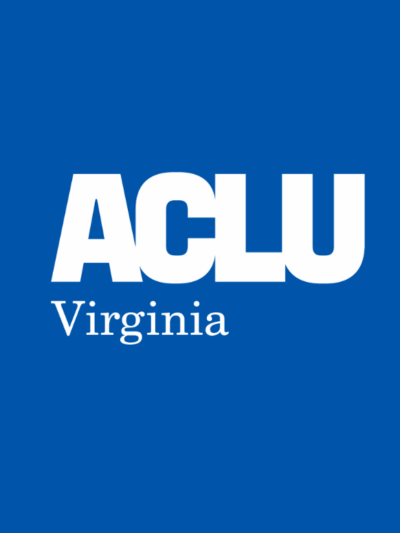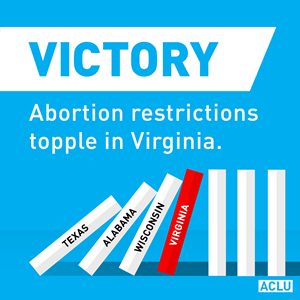News & Commentary
Nov 17, 2016
WATCH: Know Your Rights at Protests and Demonstrations
Please re-watch our Nov. 17, 2016, Facebook Live conversation on the topic of Know Your Rights at Protests and Demonstrations.

Nov 03, 2016
WATCH: Targeted Regulation of Abortion Providers
Please re-watch our Nov. 2, 2016, Facebook Live conversation on the topic of Targeted Regulation of Abortion Providers (TRAP).

Nov 02, 2016
Voting Officials, Police and Prosecutors Must be Prepared to Act on Any Voter Intimidation
The right to vote is a vital to our democracy. No person should be permitted to engage without sanction in conduct that threatens that right.

Oct 26, 2016
The Virginia Board of Health Sees TRAP Laws for What They Are: a Poorly Disguised Attempt to Close Abortion Clinics Across the State
By Gail Deady, The Secular Society Women’s Rights Legal Fellow

Oct 12, 2016
VIDEO: Let's Talk About Voting in Virginia
Please re-watch our Oct. 12 Facebook Live conversation on the topic of voting in Virginia as we run up to this year's election on Nov. 8, 2016. More information is available here, and please remember to take your photo ID to the polls and contact the ACLU of Virginia at 804-644-8080 or aclu@acluva.org if you experience problems on Election Day.

Aug 16, 2016
ACLU-VA Comments at Governor's First 'Listening Tour' Event on Police-Community Relations
The following remarks were delivered by ACLU of Virginia Executive Director Claire Guthrie Gastañaga at the first of four 'listening tour' events on the topic of police-community relations sponsored by Gov. Terry McAuliffe. The forum was held on Aug. 16, 2016, at the Richmond Police Academy.

Aug 10, 2016
Supreme Court Grants “Emergency” Stay to Stop High School Student from Using Boys’ Bathroom
By Gail Deady The Secular Society Women’s Rights Legal Fellow Note: This article was originally posted on the blog of the American Constitution Society for Law and Policy.

Aug 02, 2016
Exciting Times Nationally for Voting Rights but Va. has a Long Way to Go
Voting rights advocates are rightfully celebrating a string of recent voting rights victories in federal courts in North Carolina, Kansas, Wisconsin and Texas.The U.S. Circuit Court of Appeals for the Fourth Circuit (of which Virginia is a part) ruled unanimously in late July that North Carolina’s current voting laws intentionally and unconstitutionally discriminate on the basis of race.Right after the U.S. Supreme Court gutted the Voting Rights Act in 2013 in the case of Shelby County v. Holder, which freed North Carolina, Virginia and other southern states from the Act’s pre-clearance requirements, the North Carolina legislature acted to make it more difficult for North Carolinians to vote. Before then, North Carolina had same-day registration for all voters, pre-registration for 16- and 17-year-olds, broadly accessible early voting, out-of-precinct provisional voting and flexible voter ID requirements.The Appeals Court found that the legislature actively consulted data that made clear that African Americans disproportionately took advantage of these pro-voting laws, and that it acted deliberately and intentionally to reduce voting by African Americans. The Court’s decision was an appropriate repudiation of this injustice and intentional discrimination..The sad reality of this decision, however, is that it illuminates how much further ahead of Virginia North Carolina was before it passed the post-Shelby legislation declared unconstitutional last week.Here’s how pre-Shelby North Carolina compared to current Virginia voting rules:

Stay Informed
Sign up to be the first to hear about how to take action.
By completing this form, I agree to receive occasional emails per the terms of the ACLU’s privacy statement.
By completing this form, I agree to receive occasional emails per the terms of the ACLU’s privacy statement.

